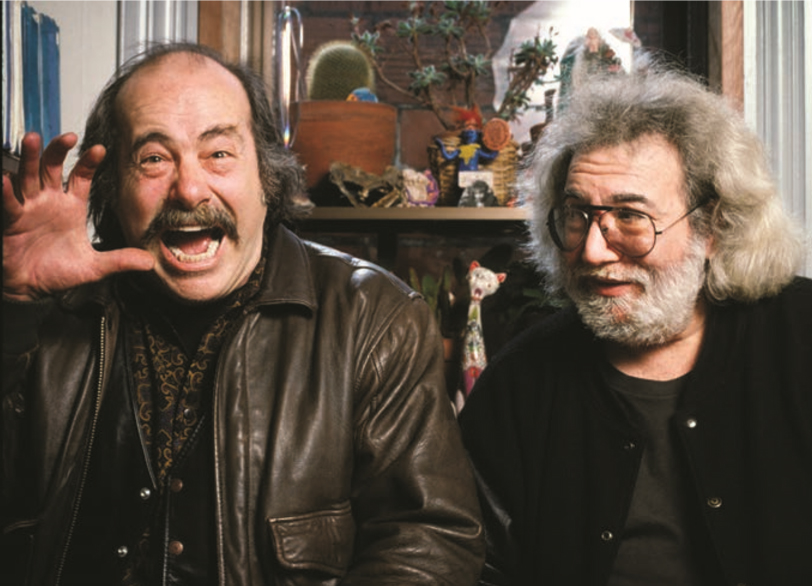“He Was Half of the Equation”: Dennis McNally Remembers Robert Hunter

photo credit: Jay Blakesberg
“He’s the only lyricist of his generation that I would put on the same page as Dylan and that’s saying something,” explains Dennis McNally, when assessing the career of Robert Hunter. McNally, the long-serving Grateful Dead publicist and eventual biographer, adds: “But he was also a moral compass, which is why ‘Truckin’’ wasn’t really used in car commercials and, God knows, we got offers. It’s just as simple as that. He was like, “No, that’s not going to happen. The Grateful Dead is something separate from the conventional world. We’re not going to be pimping for GM.’”
Do you remember when you first met Hunter?
Jerry had invited me to be the biographer [in December 1980] and I’m sure I ran into Hunter at the office around that time. However, I was smart enough not to walk right up to Hunter and say, “When are we gonna schedule the interviews, so I can download your brain?” Instead, I waited and he eventually agreed to talk. I went over to his place and, when we got to talking about “Uncle John’s Band,” he reached around to a shelf and he dug out the “Uncle John’s Band” cassette that the band had given him to write the song to. It’s a 45-minute jam just on those basic changes. It’s electric, it’s like razors, from a 1969 Fillmore tape.
I later had a conversation with Jerry and I asked how Hunter had come up with words that are perfectly consonant with what is essentially an acoustic song having heard that tape—“Of all the magic he pulled off, how did he do that?” And Jerry said, “Well, we talked about it a lot, so he had an idea of what I was going after.” Again, this was before they went into the studio [for Workingman’s Dead]. I always knew Hunter was a genius but that one was just so far out of left field that I couldn’t entirely grasp it. And to this day I’m still really impressed.
In terms of the seeing the band live, my sense is that Robert rarely, if ever attended a show. What would prompt him to come out?
I honestly don’t remember seeing him at a concert during the time that I worked for the band as publicist, which is from ‘84 on. He did tell a story at Jerry’s funeral, though, that illustrates the essential telepathy between the two of them where he mentions attending one.
Jerry had been crossing the Richmond–San Rafael Bridge during a remarkable lightning storm, and he was enjoying the spectacle because it’s a rare thing in the Bay Area. In middle of all this, “Terrapin” suddenly appears in his brain—full-blown, the whole tune. So he puts the pedal to the metal, gets home as fast as he humanly could and records it. He fiddles with it a little bit for a day or two. Then he goes over to see Hunter, who at that time lived in a house on the same body of water and had seen the same storm, which had inspired him to write eight pages of lyrics. Jerry walks in and says, “Boy, have I got a song for you!” And Hunter says, “Well, I’ve got some lyrics for you!” So Jerry takes page one, part of page two, and all of page 8 and it was effectively done that fast.
Later at Jerry’s funeral, Hunter said that he had gone to the show the first time they played it live, which was at Swing Auditorium in San Bernardino [2/26/77]. He did not go to many Grateful Dead concerts, but he felt that this one was important. And he said that when he heard it for the first time, it was as close as he has ever come in his life to having absolute certitude that this is why he was alive. This was why he and Jerry knew each other. It was just a complete affirmation.
How would you characterize Hunter’s overall contribution to the band?
He was half of the equation. Without Hunter, the Grateful Dead might have been a semi-legendary rock, jazz fusion band. Without Hunter’s lyrics I don’t know how far they would’ve gone. He had this power that fit neatly with the Grateful Dead’s maniacally improvisational bent. Hunter once said that he could articulate the hallucinations better than anybody else and that was so. He could put all that into words. Words are one of the ways people really like to communicate and he gave us the best words. [Laughs.] I know that sounds like somebody else but unlike that other guy, he really did have the best words.
This article originally appeared in the December 2019 issue of Relix. For more features, interviews, album reviews and more subscribe below.




















